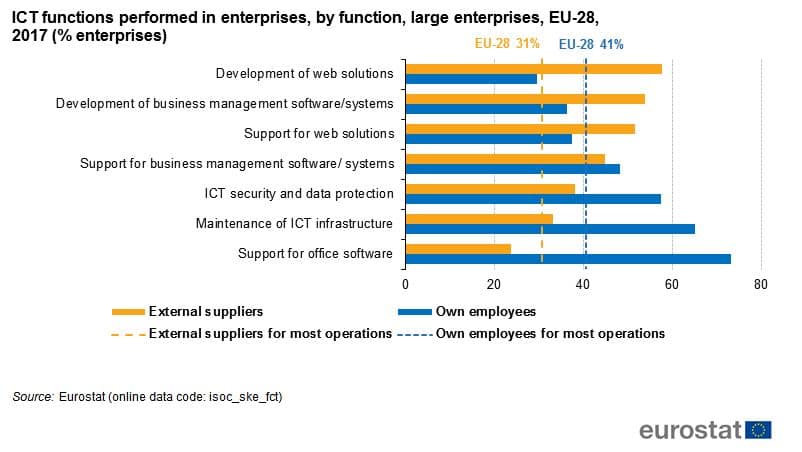If you want to create a website, mobile application, or management software for your business, you might be confused about whether to perform the task in-house or acquire outsourcing services. It’s indeed a never-ending dilemma.
When it comes to developing software, the topmost priority of every firm is to produce the highest quality product within the shortest span of time. However, hiring personnel who possess the desired level of skill set and talent isn’t a feasible choice every time.
First of all, the probability of having employed just the right person is quite low. Second, the chances that the selected person will get along with the company’s budget and culture are even lower.
These are some of the many reasons behind the rapid rise in the number of companies that prefer to outsource software development. It may come to you as a surprise but more than 50% of the businesses in Europe hire external help for developing websites.

Source: Eurostat (online data code: isoc_ske_fct)
Though outsourcing has become a widely used practice in the software industry, a hard-and-fast rule on whether you should go for this approach or not cannot be defined.
Every business has to take this decision themselves after considering their budget, time requirements, product expectations, and any other limitations.
In case you’re also facing the dilemma of choosing between in-house or outsourcing, we are listing the pros and cons of the two approaches to help you make your decision.
As the name suggests, in-house development refers to when you develop a product within your company, using your own equipment and workforce. Let’s take a look at the pros and cons of this approach:
As mentioned earlier, outsourcing refers to a company seeking the services of a third-party vendor to do projects that can’t be completed in-house. Let’s take a look at the pros and cons of this approach:
You’d have often heard that outsourcing saves you money. However, this isn’t correct in all cases.
It’s true that you don’t have to spend money on advertising vacancies, conducting interviews, making workspace arrangements, and purchasing software and hardware. Still, outsourcing isn’t a cheaper substitute every time.
When you acquire the services of a software house, you pay them for their work, equipment as well as the expertise they have developed over the years.
Outsourcing providers continuously invest in keeping their teams updated with every latest innovation there is. And this is something that also reflects in their invoices.
The importance of choosing the right outsourcing partner can’t be overemphasized. Working with a reliable outsourcing provider is important because:
While in-house development helps you build a competitive profile, it creates problems like:
On the other hand, outsourcing ensures a faster delivery, a wide pool of talent to choose from, and indirect access to the latest technologies.
However, it poses concerns like:
It can be hard to decide whether to follow the in-house or outsourcing approach. The truth is, both approaches work fine in different settings.
Outsourcing is the best approach when you’re up against a one-time project. It is absurd to invest in hardware, software, and personnel that may not be needed in the future.
In case of ongoing or long-term projects, it is generally preferable to do it in-house.
However, there’s one more option. You can go for a hybrid approach by combining both outsourcing and in-house development.
At The Web Ally we offer development staff augmentation whereby our developers will essentially become a part of your in-house team.
If you lack expertise for a project, you can seek external help while continuing to develop an in-house ability. If you are concerned about security and control, then this hybrid approach is probably the most fitting for your business.
On the other hand, if you would like to consider outsourcing, give us the chance to explain to you how we operate and explain the procedures that we have in place to overcome issues of control, communication and security.
Let us help your business succeed.
Self-service covers every aspect of life these days, but we still believe in the power of having someone to talk to. Maybe it's to bounce off ideas and explore new opportunities. Maybe it's just to say hello.
In any case, we will only use your contact details to get in touch with you regarding your enquiry - and nothing else!